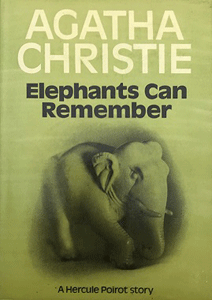“Elephants Can Remember” (1972) isn’t Agatha Christie’s worst novel — “The Big Four” and “Passenger to Frankfurt” are less readable. But it is her thinnest novel up to this point. It’s remarkable how little substance there is to this penultimate Hercule Poirot mystery.
A gunshot team-up
Ariadne Oliver and Poirot investigate a cold case from about a decade ago. A couple apparently died in a gunshot suicide pact. The mother of the young man who wants to marry the deceased couple’s daughter desires information on the mental stability in the Ravenscroft lineage. She asks Oliver, the mystery writer, for help. Oliver finds the woman “odious,” a descriptor she repeats at least four times.
Christie later repeats variations on the phrase “elephants never forget” at least a dozen times. By now, unfortunately, readers are used to the repetitiveness of late-career Christies.

“Elephants Can Remember” (1972)
Author: Agatha Christie
Genre: Mystery
Series: Hercule Poirot No. 33, Ariadne Oliver No. 8
Setting: England, 1972
“Elephants” almost achieves playfulness at the beginning, with Oliver seeming to be the main sleuth, which is rare. When she goes to Poirot for help, oddly, the novel loses something. Poirot does his thing here, but he’s not dialed in. More accurately, Christie isn’t dialed in; Poirot solves this one because the author says he does. We aren’t allowed to follow his thought process.
Fitting with the theme, the two sleuths interview several people who have heard about that fateful day, or who knew the doomed Ravenscrofts. Poirot gathers all these interviews – knowing that many are hearsay – and can see the truth within them. Conveniently, a housemaid of the Ravenscrofts does know what happened, and is ultimately willing to confirm Poirot’s guess.
Tell, don’t show
Christie isn’t bad at the “tell, don’t show” format, but she has done it better elsewhere – including on the book right before this one, “Nemesis.” Miss Marple simply talks to people about a cold-case murder until she sifts out the truth. Despite notable flaws, that novel is a strong read.
Also see the Tommy & Tuppence tale “By the Pricking of My Thumbs” for a superior investigation of a cold case via steady casual interviewing of people who might know a little something.
“Elephants” is perpetually thin because Christie never gets into these characters. They remain generic pawns in a mystery puzzle till the end. When she tries to add Shakespearean tragedy with daughter Celia and future husband Desmond reacting to the truth, it doesn’t ring true.
On the screen, perhaps actors could salvage this material. Also, oddly, “Elephants” might be enjoyed by young-adult novel readers. This is a rare novel where Christie directly references previous works (the cold cases of “Five Little Pigs,” “Mrs. McGinty’s Dead” and “Hallowe’en Party”), like a “Hardy Boys” or “Nancy Drew” novel would do.

Fewer game pieces
The game pieces are sparser than usual, like this was a short story that got expanded. It features twins and wigs and a disfigured corpse, and I don’t think it’s a spoiler to say I immediately thought of the identity switch trope. This being Christie, I figured she wanted me to think of the ID switch. Then, in the resolution, she’d reveal the ID switch possibility is a fake-out and we’d learn what really happened and I’d marvel at her cleverness.
In an extreme rarity for Christie, that’s not what happens here. The ending is bland and predictable, yet also features a plot hole it’s unlikely police detectives would overlook. Attempts to make it grandly poignant (with Poirot gathering key players at the cliffside house) notably falling flat.
In addition to doing “tell, don’t show” better in the past, other novels more effectively explore the tragedy of a potential killer with mental health issues. They are dangerous, but is it really their fault? And what’s the solution? “Crooked House” comes to mind as an elite exploration of this theme.
Christie’s weird obsession with the notion that adopted children aren’t a person’s real children is allowable in “Ordeal by Innocence” because the characterizations are thorough (if unlikely). In “Elephants,” we’re left to reflect on this bizarre belief of Christie’s.
Not good, but interesting
All told, there’s nothing new in “Elephants” and everything old is done worse than before. Yet it’s not her worst novel. For one, it’s readable, and a great ending could’ve salvaged it. That’s not the case with “The Big Four” and “Passenger to Frankfurt,” which are boring despite their complexity. “Elephants” is mildly engaging despite its simplicity.
The simplicity creates an air of resignation, like it’s all been done before. Poirot is solving this one because that’s what he does – but he’s not learning anything new from it. It’s a day at the office (and his penultimate “day,” thus creating a sad air of things coming to an end).
Further making the case for “Elephants” as a book that shouldn’t be dismissed is Earnest Painter’s Medium post intriguingly titled “Reconsidering a Bad Mystery Novel: Maybe Agatha Christie’s Worst Book is Her Best.”
Painter points to the elephant in the room that I haven’t yet mentioned: Christie was battling through dementia during her writing of “Elephants.” Rather than retiring, she gives us an example of what a novel written by a genius with dementia looks like – and, indeed, a novel about memory. It shows us what dementia has robbed from her – and readers.
The fact that “Elephants Can Remember” is passably decent (if not for the high standards of the author’s name) is arguably a remarkable achievement by the octogenarian Christie.
Sleuthing Sunday reviews an Agatha Christie book or adaptation. Click here to visit our Agatha Christie Zone.

